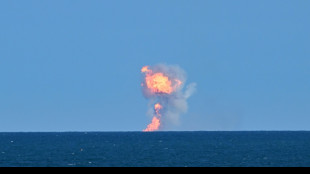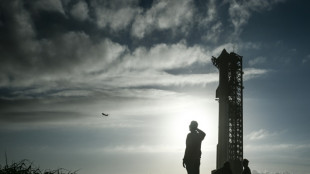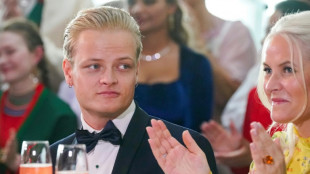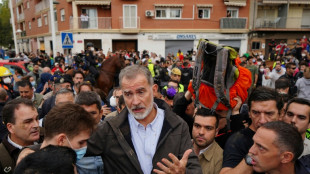
-
 General strike in Greece against cost of living
General strike in Greece against cost of living
-
Magritte painting nets auction record of $121 million

-
 Markets fluctuate as traders weigh geopolitical tensions
Markets fluctuate as traders weigh geopolitical tensions
-
Japanese, Koreans bottom of global love life survey

-
 Japan ramps up tech ambitions with $65 bn for AI, chips
Japan ramps up tech ambitions with $65 bn for AI, chips
-
Taliban govt clearing 'un-Islamic' books from Afghanistan shelves

-
 Asian markets struggle as traders weigh geopolitical tensions
Asian markets struggle as traders weigh geopolitical tensions
-
Iraq holds its first census in nearly 40 years

-
 SpaceX fails to repeat Starship booster catch, as Trump watches on
SpaceX fails to repeat Starship booster catch, as Trump watches on
-
European powers, US seek to censure Iran at UN nuclear watchdog board

-
 SpaceX fails to repeat Starship booster catch, as Trump looks on
SpaceX fails to repeat Starship booster catch, as Trump looks on
-
European stocks fall on Ukraine-Russia fears, US focused on earnings

-
 Trump names China hawk Howard Lutnick commerce secretary
Trump names China hawk Howard Lutnick commerce secretary
-
SpaceX set for Starship's next flight -- with Trump watching

-
 Top-selling daily French daily Ouest-France stops posting on X
Top-selling daily French daily Ouest-France stops posting on X
-
Russian invasion toll on environment $71 billion, Ukraine says

-
 New Botswana leader eyes cannabis, sunshine to lift economy
New Botswana leader eyes cannabis, sunshine to lift economy
-
China's Xi urges 'strategic' ties in talks with Germany's Scholz

-
 COP29 negotiators strive for deal after G20 'marching orders'
COP29 negotiators strive for deal after G20 'marching orders'
-
Walmart lifts full-year forecast after strong Q3

-
 Son of Norwegian princess arrested on suspicion of rape
Son of Norwegian princess arrested on suspicion of rape
-
US lawmaker accuses Azerbaijan in near 'assault' at COP29

-
 Spain royals to visit flood epicentre after chaotic trip: media
Spain royals to visit flood epicentre after chaotic trip: media
-
French farmers step up protests against EU-Mercosur deal

-
 Burst dike leaves Filipino farmers under water
Burst dike leaves Filipino farmers under water
-
Markets rally after US bounce as Nvidia comes into focus

-
 Crisis-hit Thyssenkrupp books another hefty annual loss
Crisis-hit Thyssenkrupp books another hefty annual loss
-
Farmers descend on London to overturn inheritance tax change

-
 Floods strike thousands of houses in northern Philippines
Floods strike thousands of houses in northern Philippines
-
SpaceX set for Starship's next flight, Trump expected to attend

-
 Several children injured in car crash at central China school
Several children injured in car crash at central China school
-
Urban mosquito sparks malaria surge in East Africa

-
 Many children injured after car crashes at central China school: state media
Many children injured after car crashes at central China school: state media
-
Asian markets rally after US bounce as Nvidia comes into focus

-
 Tens of thousands march in New Zealand Maori rights protest
Tens of thousands march in New Zealand Maori rights protest
-
Five takeaways from the G20 summit in Rio

-
 Parts of Great Barrier Reef suffer highest coral mortality on record
Parts of Great Barrier Reef suffer highest coral mortality on record
-
Defiant Lebanese harvest olives in the shadow of war

-
 Divided G20 fails to agree on climate, Ukraine
Divided G20 fails to agree on climate, Ukraine
-
Can the Trump-Musk 'bromance' last?

-
 US to call for Google to sell Chrome browser: report
US to call for Google to sell Chrome browser: report
-
Trump expected to attend next Starship rocket launch: reports

-
 Stocks, dollar hesitant as traders brace for Nvidia earnings
Stocks, dollar hesitant as traders brace for Nvidia earnings
-
Biden in 'historic' pledge for poor nations ahead of Trump return

-
 Tropical storm Sara kills four in Honduras and Nicaragua
Tropical storm Sara kills four in Honduras and Nicaragua
-
Spanish resort to ban new holiday flats in 43 neighbourhoods

-
 Phone documentary details Afghan women's struggle under Taliban govt
Phone documentary details Afghan women's struggle under Taliban govt
-
G20 wrestles with wars, 'turbulence' in run-up to Trump

-
 Stocks, dollar hesitant as traders eye US rate outlook, Nvidia
Stocks, dollar hesitant as traders eye US rate outlook, Nvidia
-
G20 wrestles with wars, climate in run-up to Trump


Russians shrug off sanctions on dollar, euro trading
Russians on the streets of the capital shrugged off new US sanctions on dollar and euro trading Thursday, claiming they had no need for Western currencies in their heavily targeted economy.
In the latest major financial punishment over Moscow's full-scale military offensive against Ukraine, the United States announced Wednesday it was sanctioning Moscow Exchange, the country's main stock market and foreign currency clearing house.
The move cuts the group off from Western financial architecture and forced it to suspend trading in both the dollar and euro.
"Given that we have sanctions and there are basically no trips abroad, we don't need dollars or euros," Yegor Danilov, a 36-year-old engineer, told AFP on Thursday, dismissing the impact the move would have on ordinary Russians.
The suspension of trading does not restrict Russian businesses, banks and citizens from buying and selling foreign currency.
But it stops deals going through the centralised exchange, pushing transactions into less liquid markets, such as direct bank-to-bank agreements or through specialised brokers and market makers.
That is likely to result in higher volatility, commissions and margins, analysts said.
London on Thursday also sanctioned the Moscow Exchange.
- 'Need to get stronger' -
Measures that target Russians' ability to buy and trade foreign currency have historically provoked a strong reaction in Moscow and throughout Russian society.
The exchange rate is seen as a key indicator of the health of the Russian economy.
When the West first hit Russia with sweeping financial sanctions in 2022, huge queues formed outside banks and ATMs ran out of dollars and euros as Russians scrambled to convert their savings into hard currency.
But two years of conflict and sanctions have somewhat limited the impact of further moves to isolate Moscow's economy.
Businesses are trading less with the West and Russians face arduous and expensive trips if they want to visit Europe or the United States, with direct flights banned.
Trades in the Chinese yuan already accounted for a majority of Moscow Exchange's foreign exchange dealings.
President Vladimir Putin has repeatedly touted Russia's strength and economic resilience in the face of Western sanctions -- a message that some in Moscow echoed on Thursday.
"Sanctions are getting stronger, but we also need to get stronger to come through this as a winner," said Valery Strakhov, a 53-year-old tour guide.
- 'Slower, more expensive' -
A few banks immediately hiked their exchange rates to as high as 200 rubles per dollar after the sanctions were introduced on Wednesday evening, spreading fear of a fresh currency crisis across social media.
But rates settled down quickly.
On Thursday, several banks had spreads -- the difference between the price at which they offer to buy and sell currency -- of between three to 10 rubles on Thursday, a typical rate.
The ruble had closed around 89 to the US dollar on Tuesday, the last trading day before the sanctions were announced.
"Everybody has been well-prepared for this, so the immediate effects are moderate," said Anton Tabakh, chief economist at Expert RA, a Moscow-based credit ratings agency.
"The exchange rate itself is unlikely to be affected much, except for the fact that in general it increases the costs in the economy. All operations with foreign currencies become slower, more expensive and more complicated," he added.
Those extra costs incurred by businesses would eventually be passed on to shoppers through price rises, he said, feeding already high inflation.
- 'Opportunity' -
Both the central bank and the Kremlin have also sought to calm nerves.
"Companies and individuals may continue to buy and sell US dollars and euros through Russian banks. All funds held in US dollars in accounts remain safe," the bank said Wednesday.
Putin's spokesman Dmitry Peskov said the regulator was "ensuring stability in all markets," state media reported.
He also said Russia was "thinking over" possible retaliatory measures to the United States over the latest sanctions.
Some Russians saw an opportunity in the volatility.
Student Ilya Mier said he "follows the political situation" for a chance to make a profit by trading dollars.
But for 18-year-old Yaroslav, also a student, it was those Western currencies -- not the ruble -- that carried the most risk.
"None of this really bothers me. It doesn't really affect prices, because I know that import substitution is a good thing," he told AFP, backing Moscow's drive to reduce its reliance on foreign goods.
He added: "And I don't invest in foreign currency, because it's questionable at the moment."
Y.Jeong--CPN
